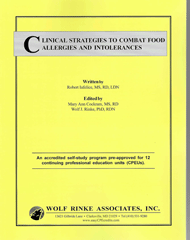|
Clinical Strategies to Combat Food Allergies and Intolerances

| C336 |
12 CPEUs |
HARD COPY |
$109.95
|
|
| C336E |
12 CPEUs |
ELECTRONIC |
$104.95 |
|
|
Approximately 10% of U.S. adults have a food allergy, and nearly twice as many adults believe they have a food allergy. Of children, 8% have a food allergy, and 40 % have multiple food allergies. Plus, food intolerance affects 15% to 20% of the population. This comprehensive CPE program will enable you to get up-to-date on this widespread and growing public health problem. More specifically it will enable you to:
- Provide expert dietary management of food allergies and intolerances in accordance with evidence-based recommendations.
- Counsel parents on the critical importance and safety of the new guidelines for the early introduction of allergenic foods, viz. peanut.
- Offer expert advice on the potential benefits of selected dietary supplements in the management and prevention of food allergies and intolerances.
- Compare and differentiate celiac disease, non-celiac gluten sensitivity, and wheat allergy.
- Describe allergic conditions associated with a food allergy, including eosinophilic esophagitis and food-dependent exercise-induced anaphylaxis.
Share with a friend and Save! Click here for important information about
sharing.
To order an ADDITIONAL Reporting Form click below:
| C336F |
12 CPEUs |
REPORTING FORM |
$40.00 |
|
Clinical Strategies to Combat Food Allergies and Intolerances© 2024 Wolf Rinke Associates. All rights reserved for this self-directed accredited learning activity. Reproduction in whole or part without written permission, except for brief excerpts, is prohibited.
OBJECTIVES
Upon completion of this CPE activity, you will be better able to:
- Discuss the various types of food allergies and food intolerances: their pathophysiology, clinical manifestations, and how they differ.
- Recognize the strong association between imbalances in the gut microbiota and the increasing rate of food allergy, and how this interaction is impacted by diet and probiotics.
- Educate patients on the recommended methods of food allergy testing and proper follow-up versus unproven and misleading food sensitivity testing.
- Provide expert dietary management of food allergies and intolerances in accordance with evidence-based recommendations.
- Apply maternal diet and supplement strategies for food allergy prevention to pregnant women at high risk of having children with allergies.
- Counsel parents on the critical importance and safety of the new guidelines for the early introduction of allergenic foods, viz. peanut.
- Offer expert advice on the potential benefits of selected dietary supplements in the management and prevention of food allergies and intolerances.
- Identify signs and symptoms of food-induced anaphylaxis.
- Compare and differentiate celiac disease, non-celiac gluten sensitivity, and wheat allergy.
- Explain the cause and development of oral allergy syndrome.
- Assess which patients might benefit from a low FODMAP diet.
- Describe allergic conditions associated with a food allergy, including eosinophilic esophagitis and food-dependent exercise-induced anaphylaxis.
ABOUT THE AUTHOR
Robert Iafelice, MS, RD, LDN is a freelance medical writer and member of the American Medical Writers Association. He has contributed several chapters to the 6th edition of Disease Prevention and Treatment, a medical reference book of evidence-based protocols to combat the diseases of aging. Among the protocols he authored, “Celiac Disease and Non-Celiac Gluten Sensitivity” is particularly relevant to this CPE program.
Robert received a Bachelor of Arts degree in Chemistry from Miami University in Oxford, Ohio, and a Master of Science degree in Nutrition Science from Case Western Reserve University in Cleveland, Ohio. Most of his experience as a practicing registered dietitian was in the field of integrative/functional medicine with a focus on food allergy. Robert provided medical nutrition therapy at an integrative allergy-immunology clinic in Chicago, where he specialized in conducting double-blind, placebo-controlled food challenges – the gold standard for food allergy diagnosis.
Robert’s diverse background also includes extensive experience in fitness/wellness as a gym owner, university nutrition instructor, health educator in the nutraceuticals industry, and oncology. His other writing interests include intermittent fasting, nutritional ketosis, and high-intensity interval training.
Return to the top of page
If you prefer to order by phone, mail
or fax click below
or click here to contact us with
other questions.
For information about our other products and
services return to the sidebar at the top of the page.
|
|
|


